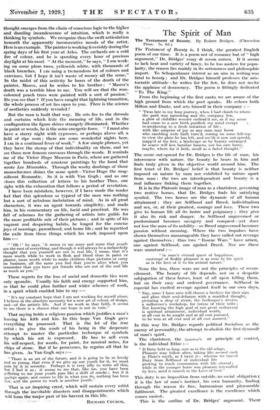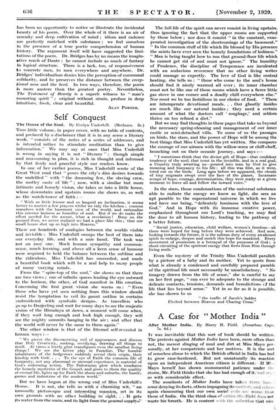The Spirit of Man
The Testament of Beauty is, I think, the greatest English poem of our time. It is a poem not of romance but of " high argument," Dr. Bridges' essay de return natura. If it seems to lack heat and variety of fancy, to be too austere for popu- larity, the reason lies mainly in its seriousness and philosophic import. To Schopenhauer interest as an aim in writing was fatal to beauty ; and Dr. Bridges himself professes the aris- tocratic attitude—he writes for the few, he does not invite the applause of democracy. The poem is fittingly dedicated "To The King."
From the beginning of the first canto we are aware of the high ground from which the poet speaks. He echoes both Milton and Dante, and sets himself in their company :—
" 'Twas late in my long journey, when I had elomb to where the path was narrowing and the company few, a glow of childlike wonder enthral'd me, as if my sense
had come to a new birth purified, my mind enrapt • re-awakening to a fresh initiation of life ; with like surprise of joy as any man may know who rambling wide hath turn'd, resting on some hill-top to view the plain ho has left, and see'th it now out-spredd, mapp'd at his feet, a landscape so by beauty estranged he scarce will ken familiar haunts, nor his own home, • maybe, where far it lieth, small as a faded thought."
The scene out-spread for Dr. Bridges is the life of man, his intercourse with nature, the beauty he bears in him and finds truly given in the objective world around him. The first tenet of Dr. Bridges' belief is that beauty is neither imposed on nature by man nor exhibited by nature apart from man : the two are interdependent and beauty is a real influence linking them together.
It is in the Platonic image of man as a charioteer, governing two restive horses, that Dr. Bridges finds his satisfying symbol. The two horses are the dynamic of all human attainment : they are Selfhood and Breed, individualism and sex, or, at their greatest, courage and love. These two give to human life all its lustre and poignancy ; they give it also its risk and danger. As Selfhood ungoverned or predominant becomes savagery and conquest—yet does not lose the aura of its nobility—so Breed ungoverned becomes passion without meaning. Where the two impulses have shown themselves unmanageable they have called out revenge against themselves ; thus two " Essene Wars " have arisen, one against Selfhood, one against Breed. Nor arc these wars unnatural
in man's eternal quest of happiness, - contempt of fleshly pleasure is as near to his spirit as is the love of it to his animal nature."
None the less, these wars are not the principles of recon- cilement. The beauty of life depends, not on a despotic subjugation of these horses, least of all upon killing them, but on their easy and ordered governance. Selfhood in especial has excited revenge against itself in our own days.
"Nay, some I have seen will choose a beehive for their sign
and gloss their soul-delusion with a muddled thought, .
picturing a skep of straw, the beekeeper's device, a millowner's workshop, for totem of their tribe ; Not knowing the high goal of our great endeavour is spiritual attainment, individual worth, at all cost to be sought and at all cost pursued, to be won at all cost and at all cost assured."
In this way Dr. Bridges regards political Socialism as the enemy of personality, the attempt to abolish the first dynami of man's spirit.
The charioteer, the iyepovtx4 or principle of control, is the individual Ethic :— " If Duty held us long, now as in the old adage, Pleasure may follow after, taking like second rank in Plato's myth, as I twist it : wherein we traced Duty from Selfhood of individual life
growing to reach communion with life eternal ; while in the younger horse was pleasure intensified by love, until it issueth in the Love of God."
This duty is no imposition from outside, no social obligation it is the law of man's instinct, his own humanity, finding through the reason its free, harmonious and pleasurable fulfilment. The greatest excellence is the excellence which comes easiest. • • - • This is the outline of Dr. Bridges' argument. There
has been no opportunity to notice or illustrate the incidental beauty of his poem. Over the whole of it there is an air of serenity and deep cultivation of mind ; idiom and cadence are perfectly matched with substance ; we feel ourselves in the presence of a true poetic comprehension of human history. The argument itself will have suggested the limi- tations of the poem. Dr. Bridges has by no means the imagin- ative reach of Dante : he cannot include as much of fantasy In logical structure. There is a lack, too, of responsiveness to concrete men, to men everywhere and anywhere. Dr. Bridges' individualism denies him the perception of communal solidarity, and he preserves the distance between the excep- tional man and the herd. In two ways, therefore, the poem is more austere than the greatest poetry. Nevertheless, The Testament of Beauty is a superb witness to "man's mounting spirit " ; original without strain, profuse in deep intuitions, fresh, clear and beautiful.
ALAN PORTER.









































 Previous page
Previous page